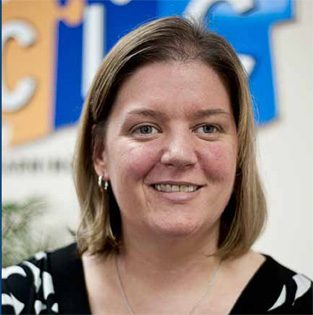By Evra Taylor
 Anyone who starts a discussion with, “It’s an honour to be interviewed,” has a degree of humility seldom seen in pioneers and visionaries. But then, Melanie Cooper is an exception to the rule in many respects.
Anyone who starts a discussion with, “It’s an honour to be interviewed,” has a degree of humility seldom seen in pioneers and visionaries. But then, Melanie Cooper is an exception to the rule in many respects.
In 1995, at age 21, Cooper, a Mississauga native, was diagnosed with optic nerve atrophy which caused her to lose the sight in her left eye. She had optic nerve pressure on her right eye, as well. Cooper underwent optic nerve fenestration to relieve pressure on the optic nerve of her left eye and three days later, she suffered a stroke. She was in a coma for two weeks and when she emerged from it, she was blind and paralyzed. Said Cooper: “I didn’t fit the profile for a stroke and no one wanted to say the ‘s’ – stroke – word to me.”
Cooper had to relearn everything from scratch, including the everyday activities most of us take for granted. After extensive rehabilitation and a life skills program at CNIB’s Intensive Rehabilitation Training Centre (IRTC), she took part in an orientation and mobility program that taught her to use a white cane and to enhance her hearing skills in order to compensate for her lack of sight. Cooper now has 20/200 vision in her right eye and 20/400 in her left one. She is able to see light and dark, as well as shapes, and she can read size 14 font in her right eye if she holds the paper close to her face.
During her rehabilitation period, Cooper’s social worker was concerned because, unlike most other people in her situation, she didn’t experience depression and didn’t cry. She recalls that instead, she kept saying, “I have to get back to normal,” insisting that she would return to university in a few months. “Those good thoughts kept me going. Although I had to move back home, I had only one day of pity. I think my sisters would have kicked my butt if I’d fallen into a depression.”
Cooper’s unfailing optimism stood her in good stead as she moved on with her life, pursuing a career in teaching – her lifelong passion. She enthusiastically attended teachers college through York University, asserting that, “Just because I’m vision impaired, I don’t think I should stop living my dream.” Her bold achievement was unprecedented. Armed with a BA in education, Cooper became the first legally blind student to graduate as a teacher in Ontario in 1998. In fact, she placed at the top of her class. But despite her high standing, prospective employers would not hire Cooper because they viewed her blindness as a liability.
Undaunted by the rejection and not one to have barriers imposed on her, Cooper forged ahead to realize the true vision for her life, one which extended far beyond the classroom: she wanted to open her own school for the vision-impaired because at the time there were no such academic programs available at the post-secondary level for adults with disabilities in Peel Region. Cooper knew she could fill the gap and give back to the blind community in a meaningful way as someone who had been there herself.
On June 25, 2010, Cooper launched the Connect Learning Centre in Mississauga, ON. The centre offers life skills programs encompassing such subjects as money management, job skills, social skills and classes on ways in which the disabled can advocate for themselves. Cooper’s clients include a wide range of individuals, including those with vision loss, intellectual disabilities and cerebral palsy, along with stroke survivors. Cooper stated, “The benefits of these programs are tremendous. They impart confidence to the participants.” Currently, she has a staff of four teachers and sees roughly 18 clients each week. “All of the staff have had some involvement with disability. To work here, the criterion is that you have to be as passionate as I am about helping these people.”
Cooper points out that independence means different things to different people. For some, tying their shoes is a goal while others need to improve their computer skills so they can get a job.
Acknowledging that it takes her longer to accomplish certain tasks than a sighted person, Cooper admits to having what she calls “frustration days” caused by her lack of independence because she cannot drive. She strongly dislikes the idea of having to depend on others.
The support of family and friends has been central to Cooper’s ability to thrive. “Everyone needs to be surrounded by positivity and love. I have several vision-impaired friends and a friend with the same condition as mine understands what I’m going through. In order to fully understand a disability, you’ve got to have it and live it.”
Cooper believes that the need for the type of assistance she provides “is huge” and she has had requests for expansion to other areas of activity. Her ambition is to make the learning centre as successful and sustainable as possible and to help as many people as she can. “I want to create a ready-made ‘program in a box’ that can be used in other communities,” she says, adding: “I said to my mom that things happen for a reason and that my loss of sight is the best thing that has ever happened to me because it changed my attitude and made me truly appreciate my life”.
For more information, visit www.connectlearningcentre.com.







